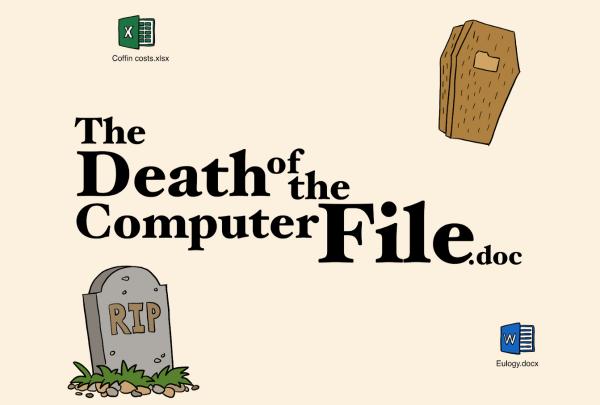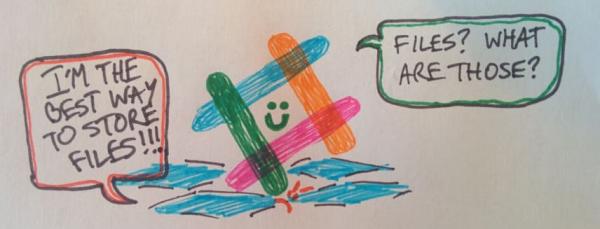If YOUR files are really doomed, it will be only YOUR fault
Digital files are your life. Why should you give them up?
In the last decades, our lives have been preserved and organized as digital files that we could control. Until a few years ago, that is. Then, what still passes as “innovation” has made things dangerous, and stupidly unproductive.
This is what your (digital) life is today
(this and the next paragraphs are a collection of edited quotes from two great posts, “Computer files are going extinct” and “Everything is amazing, but nothing is ours”)

- Until the mid 2000s, software and the internet were still based around distinct objects that you could understand, and were yours. YOU had to own, name and organize your own digital files properly, just like paper documents
- When you copy a digital file from one computer folder to another, the copy is identical to the first version. When you upload them to places like Facebook, or Google Cloud, and then download them again, the file you get is different from the original
- The archives of websites of 18+ years ago consist of files that still “just work”. The archives of websites made 18 months ago are useless without installing and restarting lots of complex, interdependent software programs and libraries
- Services like Google Docs do not let you sort or organize your files [in any way] that is not “prioritize the new over the important”.
- [all this] seems to reduce the value of any individual creative act. Rather than warranting their own file, [your data and creations] are all just lines in a database, somewhere in the sky.
- This lack of control, together with mobile apps that don’t work with each other, has lead many people to use their email inboxes to organize files. An “inefficient, terribly designed” solution, that works because it minimizes dependencies.
The real nature of the change, and its cost

Today’s “innovation” attempts to move people away from ownership and towards access in any field, from files to cars and music. You are pushed from worlds of scarcity, made out of things (including digital files) to worlds of (apparent) abundance… made out of dependencies.
The performance gain and ease of use are irresistible, but have a huge cost: that cost is complexity, outsourced agency, and brittleness.
That cost is that the more you can access, the less it’s yours, and the less it is stable.
The Yahoo Groups reminder
The cost of ownership is up front and visible; the cost of access is back-dated and hidden, but very real nevertheless.

A great, recent example of"back-dated, hidden cost" comes from Yahoo. In 2009 they shut down some 7 million personal websites, destroying “the most massive amount of history in the shortest amount of time with absolutely no recourse." (*). In October 2019, Yahoo announced the permanent removal of all content inside Yahoo Groups, including many groups like “one run by Cold War vets, with lots of non-replaceable information and discussion”.
It needs not to be like this
One of those posts concludes that “Technology that’s Actually Yours could be the next great counter-trend”.
“Could”? No, it has to be the next great thing. THAT would be real innovation. And it is already doable. All it needs is the right invest ment in the right direction(s). Here is one proposal from me, but there are many others. And in all cases, education to want and develop real innovation, must be the first step. Starting from policy makers, of course.
Image sources: snapshots of the linked posts.
(*) But some Geocities content is still available online!.
Who writes this, why, and how to help
I am Marco Fioretti, tech writer and aspiring polymath doing human-digital research and popularization.
I do it because YOUR civil rights and the quality of YOUR life depend every year more on how software is used AROUND you.
To this end, I have already shared more than a million words on this blog, without any paywall or user tracking, and am sharing the next million through a newsletter, also without any paywall.
The more direct support I get, the more I can continue to inform for free parents, teachers, decision makers, and everybody else who should know more stuff like this. You can support me with paid subscriptions to my newsletter, donations via PayPal (mfioretti@nexaima.net) or LiberaPay, or in any of the other ways listed here.THANKS for your support!